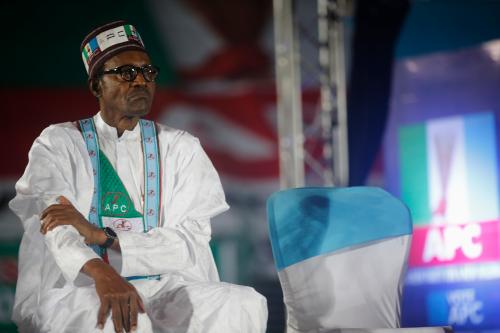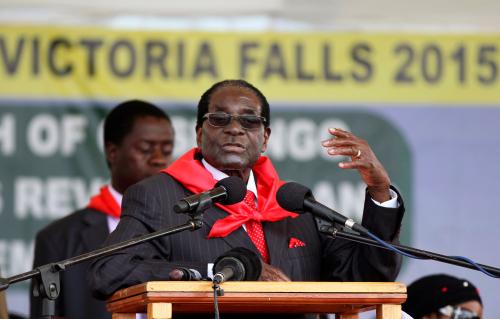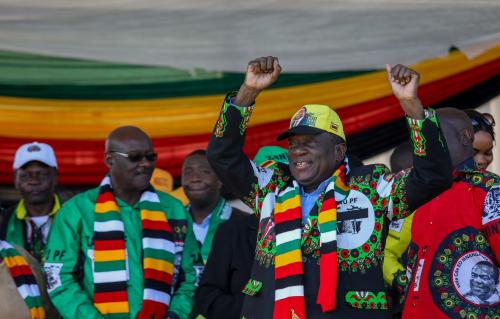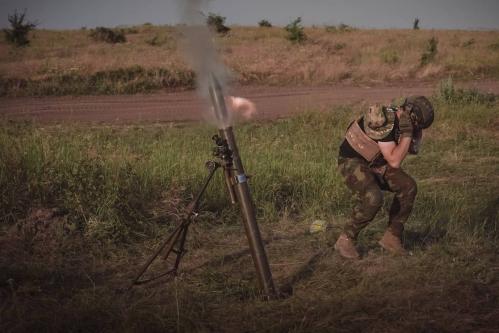Zimbabwean military takes control of state institutions
Political tensions within Zimbabwe’s ruling Zanu-PF party came to a head this week after months of factional infighting. In the early morning of Wednesday, the Zimbabwe Defence Forces took custody of President Robert Mugabe and his family. The army also took control of the national Zimbabwe Broadcasting Corporation, Mugabe’s Harare offices, and the Police Support Unit. Army Chief of Staff Major General SB Moyo issued a statement on the state television network, announcing that Mugabe and his family were being held in a secure location as “criminals around him who are committing crimes that are causing social and economic suffering” were detained. He also asserted, “We wish to make it abundantly clear that this is not a military takeover of government. What the Zimbabwe Defence Forces is doing is to pacify a degenerating political, social and economic situation in our country which if not addressed may result in violent conflict.” On Friday, though, Bloomberg reported that, if Mugabe does not resign, he could be impeached.
These actions by the army follow Mugabe’s firing of Zimbabwe’s Vice President Emmerson Mnangagwa last week over accusations from First Lady Grace Mugabe and other detractors that Mnangagwa planned to overthrow the government. Mnangagwa held close relationships with the army leadership and was widely believed to be next in the line of succession.
Mnangagwa’s sacking was thought to pave the way for Grace Mugabe to succeed her husband as president—a move that drew ire from the army. At a press conference on Monday held by senior army officials in reaction to Mnangagwa’s dismissal, General Constantino Chiwenga said, “The current purging, which is clearly targeting members of the party with a liberation background, must stop forthwith.” On Thursday, Mugabe engaged in direct talks with army chief General Chiwenga and two South African envoys from the Southern African Development Community (SADC) at the State House in Harare to discuss the future of his rule—although a conclusion has yet to be reached. Then on Friday, Mugabe made his first public appearance since the military takeover at a graduation ceremony in Harare, but neither the army nor the presidency made an announcement regarding a resolution to the political crisis.
The United States steps up its engagement with Africa
On Wednesday, U.S. Ambassador to the United Nations Nikki Haley gave remarks on the crisis in South Sudan at the U.S. Holocaust Museum. Her speech described her recent trip to the continent, the atrocities she witnessed there, and her conversation with President Salva Kiir, in which she stressed the administration’s increasingly unsteady support for his regime: “The United States is both generous and patient, but we are not without our limits,” she said. “Entire generations are being lost in South Sudan. Families are being destroyed. We cannot and will not look away.” Her pressure might be showing results: After her conversation with Kiir last week, the president promised “free, unimpeded and unhindered movement” for humanitarian efforts in his country.
Haley also remarked extensively on the current suffering and tribulations facing the people of South Sudan, but also emphasized the resilience in the people there, stating, “But even in the midst of all the pain and all the suffering, there was dignity. South Sudanese refugees just want to be able to go home and live normal lives. They want desperately to be productive and self-sufficient.”
Also this week, the U.S. Africa Command (AfriCom), in coordination with the Somali government, launched another drone strike on al-Shabaab and the Islamic State in Somalia. This strike follows five more that occurred just last week that killed 40 combatants. The U.S. has begun to prioritize the area due to an increase of IS fighters there and already has about 500 troops stationed in the country. Earlier this year, President Trump loosened the restrictions on AfriCom for conducting airstrikes against terrorists there. The State Department has also evacuated its non-essential staff from the country given the rise in IS presence.
Beyond humanitarian and security issues, the U.S. is showing signs of engaging African leaders on economic issues this week: On November 16 and 17, Secretary of State Rex Tillerson hosts 36 African foreign ministers to discuss U.S.-Africa relations beyond aid, including conversations around trade, investment, and good governance.
Kenya Airways completes restructuring while West African airlines look to expand
Kenya Airways and its lenders released terms for restructuring its debt in a debt-for-equity swap this week. Under these terms, the Kenyan government and 11 local banks will own nearly 90 percent of the airline. The government’s stake will rise from 29.8 to 48.9 percent while local lenders will own 38.1 percent of the airline, and Air France KLM’s share will fall from 26.7 to 7.8 percent. Mbuvi Ngunze, the former Kenya Airways CEO and an adviser on the deal, termed this a “$2 billion restructuring.” The government has also offered contingent guarantees on $750 million of the airline’s debt. As part of the restructuring process, shares of Kenya Airways were suspended from trading on the Nairobi Stock Exchange for two weeks starting Wednesday.
The restructuring of the airline comes after the airline posted the largest annual corporate loss in Kenya’s history of $251 million in 2016. The company has posted losses for five consecutive years on the back of high financing costs and the purchase of new Boeing aircrafts. Losses have narrowed this year, however, with a 20 percent drop in 2017 first half losses compared to the same period last year. This week, the airline also announced plans to start flying to New York—its first destination in the United State in the next 6 to 12 months.
At the same time, West African airlines are embarking on ambitious plans, as Air Senegal signed a memorandum of understanding with Airbus to buy two A330neo jets at the Dubai Airshow, and the African Development Bank approved $114 million in loans to help Air Côte d`Ivoire purchase five Airbus A320 planes to improve domestic and regional connectivity.










Commentary
Africa in the news: Zimbabwe’s political crisis, new US-Africa engagement, and African airlines’ restructuring and expansion
November 17, 2017